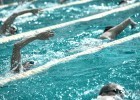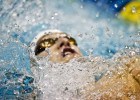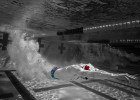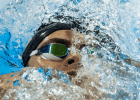3 Ways to Maintain your Strength In Swimming
Staying in better shape by maintaining your strength from one season to the next will help you manage preseason training better and set you up for a great training cycle. Let’s discuss three ways you can maintain your strength over the course of your break.
Swimmers, Sweat, and Why You Need Electrolytes
In the water, the obvious indicators of dehydration are less apparent—excessive sweating, dry mouth, overheating, etc., so it’s easy to forget to drink fluids steadily throughout practice.
3 Exercises for Powerful Long Axis Strokes
Add the following exercises to your repertoire to individualize your strength program for the events that you swim. Begin by incorporating at least one or two of these stroke-specific exercises into each strength training session.
3 Steps to Maximize Your Endurance for Long Course
In a 50-meter pool you can’t rely as heavily on turns, underwaters, or breakouts to help you pick up easy speed along the race. We’ve got a few tips to help you be more efficient in practice and faster at the end of your races this summer.
3 Tips on Summer Sun Exposure
Whether you swim under the sun every day at practice or catch some rays at one meet in the next few months, protecting your skin is critical to your health now and in the long term. Let’s discuss sun exposure and how it relates to you.
3 Exercises for Powerful Short Axis Strokes
This week we’ll address the 3 short axis exercises that will help make your butterfly and breastroke both easier and faster.
Your Top Recovery Methods for High-Volume Training
Spring training involves a heavy dose of yardage paired with intense dryland. Swimmers jump head first into high-volume practices while managing soreness and fatigue from their general strength and conditioning on land. Proper recovery helps athletes stay healthy and consistent with their training year round.
Going Back to the Drawing Board
When the championship meet is over—whether it’s the Olympics, NCAA’s, junior nationals, high school championships, or anything in between—swimmers need…
How Foam Rolling Maximizes Your Performance
Foam rolling uses your bodyweight against a cylindrical foam roller to produce some of the same positive effects on your body that deep tissue or sports massages provide, at a fraction of the cost.
5 Steps to Kick Start Your Spring Training
Spring is a fresh start for swimmers as they re-focus their training toward summer competition. Following taper, a championship meet, and a few days off from practice, however, that “re-focus” part can be difficult. Here are 5 steps to kick start your spring training…
4 Hacks for Faster Prelims Racing
Many swimmers find it harder to race fast in the morning for a number of reasons. Let’s discuss the 4 things you can do to gear up for a clutch morning performance, and ultimately, a dynamite finals session.
3 Reasons to Stretch While Tapering
In order to reduce stiffness and feel ready to compete, you can gently move your muscles through a few stretches. Stretching boosts blood circulation to muscle tissue, helping your body exchange waste products for oxygen and nutrients.
How to Improve your Stress Management In Swimming
As we near the end of the academic year, swimming is just beginning to pick up steam. Preparing for final exams and projects can be difficult when swimmers need to travel for competitions and focus on racing.
3 Steps to a More Explosive Relay Start
There are many styles to a relay start. Power and reaction time are critical to all of them. Let’s take a look at the top 3 things you can do to sharpen your relay start.
Travel Meets: 5 Things to Do on Arrival
From the moment you land in a new place for a meet, the rest of your day should follow the same pattern every time you travel—that is to say, what you do on arrival day must become second nature to you.













